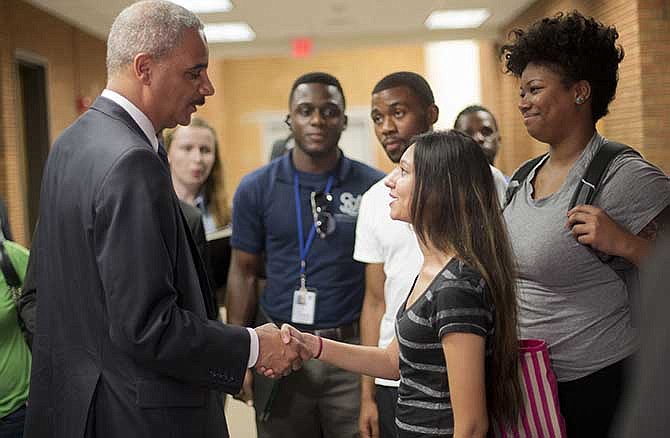Originally posted at 6:11 p.m. Last updated at 10:23 p.m.
ST. LOUIS (AP) - Attorney General Eric Holder sought Wednesday to reassure the people of Ferguson about the investigation into Michael Brown's death and said he understands why many black Americans do not trust police, recalling how he was repeatedly stopped by officers who seemed to target him because of his race.
Holder made the remarks during a visit to the St. Louis suburb that has endured more than a week of unrest fueled by the fatal shooting of the black 18-year-old by a white officer. The Obama administration intended the trip to underscore its commitment to civil rights in general and the Ferguson case in particular.
The attorney general described how he was stopped twice on the New Jersey Turnpike and accused of speeding. Police searched his car, going through the trunk and looking under the seats.
"I remember how humiliating that was and how angry I was and the impact it had on me," Holder said during a meeting with about 50 community leaders at the Florissant campus of St. Louis Community College.
Holder also met with federal officials investigating Michael Brown's Aug. 9 death and with Brown's parents.
Once while living in the Georgetown neighborhood of Washington, Holder was running to catch a movie with his cousin when a squad car rolled up and flashed its lights at the pair. The officer yelled, "Where are you going? Hold it!" Holder recalled.
His cousin "started mouthing off," and Holder urged him to be quiet.
"We negotiate the whole thing, and we walk to our movie. At the time that he stopped me, I was a federal prosecutor. I wasn't a kid," he said.
Holder met briefly with Missouri State Highway Patrol Capt. Ron Johnson, who has been in charge of security in Ferguson for nearly a week. The National Guard is also helping to keep the peace.
Asked whether he had confidence in the local investigation of the police officer, Johnson said Holder's presence "is a guarantee on that."
In nearby Clayton, a grand jury began hearing evidence to determine whether the officer, Darren Wilson, should be charged in Brown's death. A spokesman for St. Louis County Prosecutor Bob McCulloch said there was no timeline for the process, but it could take weeks.
Outside the St. Louis County Justice Center, where the grand jury convened, two dozen protesters gathered in a circle for a prayer, chanted and held signs urging McCulloch to step aside.
McCulloch's deep family connections to police have been cited by some black leaders who question his ability to be impartial in the case. McCulloch's father, mother, brother, uncle and cousin all worked for the St. Louis Police Department, and his father was killed while responding to a call involving a black suspect.
The prosecutor, who is white, has insisted his background will have no bearing on the handling of the Brown case, which has touched off days of nighttime protests during which authorities used tear gas and rubber bullets to clear the streets.
On Wednesday, police said an officer had been suspended for pointing a semi-automatic assault rifle at demonstrators, then cursing and threatening to kill one of them. A protester captured the exchange on video Tuesday and posted it to YouTube and other websites.
Some protesters returned to the streets Wednesday evening but in diminishing numbers. They marched around a single block as a thunderstorm filled the sky with lighting and dumped rain. Police still stood guard, but many wore regular uniforms rather than riot gear.
In a letter published in the St. Louis Post-Dispatch, Holder promised a thorough investigation while calling for an end to the violence in Ferguson. He said the bond of trust between law enforcement and the public is "all-important" but also "fragile."
Arrest patterns "must not lead to disparate treatment under the law, even if such treatment is unintended. And police forces should reflect the diversity of the communities they serve," Holder wrote.
The Justice Department has mounted an unusually swift and aggressive response to Brown's death, conducting an independent autopsy and sending dozens of FBI agents to Ferguson in search of witnesses to the shooting.
Meanwhile, Brown's funeral arrangements were set. The funeral will be Monday at Friendly Temple Missionary Baptist Church in St. Louis, according to the Austin A. Layne Mortuary, which is handling arrangements.
Brown's uncle, the Rev. Charles Ewing, will deliver the eulogy. The Rev. Al Sharpton will also speak.
Brown will be buried at St. Peter's Cemetery in St. Louis County.
Holder said the Obama administration has been working to achieve change through the Justice Department's civil rights division.
"The same kid who got stopped on the New Jersey freeway is now the attorney general of the United States," he added. "This country is capable of change. But change doesn't happen by itself."
Associated Press writers Jim Salter in St. Louis, David A. Lieb in Jefferson City and Nigel Duara in Ferguson contributed to this report.
Related video:

